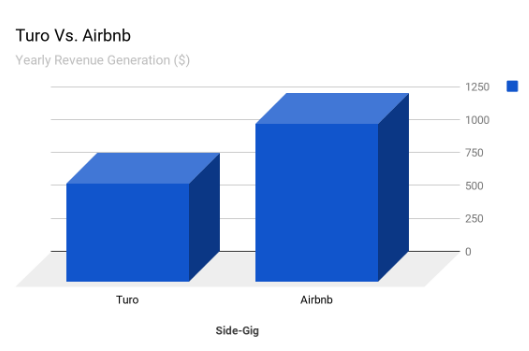Turo is often misinterpreted as the ‘Airbnb of cars’. Although both Airbnb and Turo being sharing economy startups, it is important to look past their common similarities and how they compare to each other. Let’s start off with the basic knowledge about the two companies, about how they operate, and what services they provide.
On face value, Turo and Airbnb operate very similar. Turo is a car-sharing marketplace company, connecting private owners to share out their vehicles in order to earn money, whereas Airbnb is an online marketplace where you are offered to rent a place, both suffer the same seasonality associated with the tourism industry and both portray as a lifestyle brand.
In this piece, I will be examining Airbnb and Turo from a Host perspective on the basis of startup costs, management, and the overall appeal and future both the startups seem to be headed towards to.
Start-up Costs
Investing in one of the two side-gigs has a big-difference financially. Of course, buying a car and then putting it up on Turo to be rented by someone will cost very less, especially due to easy loan policies and low interest rates. In comparison, taking a mortgage for investing in a real estate property to be put up on Airbnb is way more complex than the former scenario. In short, the barriers to entry are way higher on Airbnb than Turo.
Exit strategy:
Investing in a real estate business requires a larger amount of seed investment, and higher transaction costs leading to a higher gamble on your money. Whereas spending a down-payment on a car will be a lesser risk considering the low starting costs and easier exit strategy.
Revenue
Revenue wise, Airbnb is a the ultimate cash-cow, but Turo has a better asset turnover ratio (dollar amount of sales or revenues to its total assets). Additionally, it offers you a sense of control over where you can travel on your vacation all by yourself.
Turo Vs. Airbnb Yearly Revenue Generation

Management
When you think of comparing the two companies on managing their respective services, I think that operating an Airbnb is much easier to manage than operating a service of Turo. Car management puts a whole lot of hassle to the task than managing a house. A car is always on the move. Whereas, the apartment or house is always there. Statistically there is just fewer unknowns. Therefore, it’s easy to automate and setup systems and procedures with a car. For example, merely setting up a house-keeping service to clean your rental house is way simpler and less annoying than taking out your car for tuning, oil changing, car washing, etc. You know the works. Hence, there is an extra effort in dealing with operating and managing a Turo car. Having said that, with the quick-rise in the auto sharing industry there has been an improvement in the ecosystem. You can now order oil changes on demand that comes to you, car-washes, there are now car-wash cards that guests can use to have the car washed themselves and therefor pushing the burden and time out to the guest, messaging can also be automated with bots and template responses by third party services (I go over more automation and system techniques in my course ____).
Appeal
Appeal, AKA, the cool-factor. You want to drive a nice car, everyone does, who doesn’t. The envy is just out there, you can be banking on Airbnb but the fact that you can show off your Porsche, Tesla car to anyone is just a better flex. Comparatively for Airbnb hosts, even a nice Airbnb place is not going to be available all that much. A cool car collection that you change and alternate between, on the other hand, is another level of cool. It means that you can show off without having to take everyone to the place where you are staying. It gives an edge to Turo over Airbnb. The cool-factor of Turo is downplayed, but showing off a different car everyday is way over the top lifestyle.
Fun fact: All jokes aside, Andre Haddad, Turo’s CEO, had his own car collection on Turo.
Conclusion
Airbnb, by providing you a house also provides you with peace of mind of an unmovable, appreciating asset (nothing beats real-estate). Turo, on the other hand, gives you a higher status especially if you, or your career requires a network. Turo is an easier shot at a side-gig investment with way easier startup costs. Revenue wise, Airbnb is a the ultimate cash-cow, but Turo has a better asset turnover ratio. Although investing in Turo is easier and more reliable, but it is only a short-term investment. If you really want to make money from one of these side-gigs, you should take a bigger leap and invest in a good real estate property with a good view and a great location. Better if keep a car or two on Turo, I think that is the sweet spot of the sharing economy.. Hence, attracting tourists and families in order to enjoy the peace of mind by living in a calm and relaxed places on their vacations. Airbnb provides you with a better long-term investment opportunity as a buyer but it comes with more risks, and a higher saturation level than Turo. All in all, both can be done, and an Airbnb guest can always be upsold to rent a Turo car (you can read more about this in my article…)
